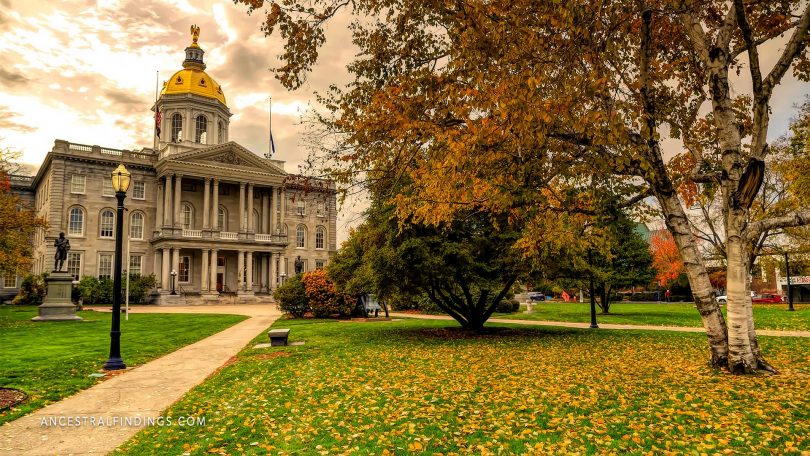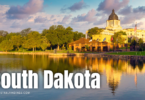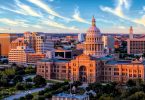The capital of the state of New Hampshire is Concord. The city is also the county seat of Merrimack County. It has a population of about 43,000 people. The city was initially settled at the village of Penacook, which is located at the northern boundary of the city limits of Concord. The University of New Hampshire School of Law is located there, which is the only law school in New Hampshire. Also located in Concord are St. Paul’s School (which is a private preparatory school), NHTI (a community college with a two-year program), the New Hampshire Fire Academy, and the New Hampshire Police Academy.
Of local interest, Franklin Pierce is buried in Concord. He was the 14th President of the United States.
The Abenaki Native American tribe inhabited the area that is now Concord before Europeans came. The local branch of the Abenaki who lived there was called the Penacook. They came to the area thousands of years before the Europeans did. The Penacook was a fishing tribe, using the rivers of the area to fish for sturgeon, salmon, and alewives. They fished with nets, mostly in the rapids area of the Merrimack River. They also used the river to travel to different hunting and trading areas using their birch bark canoes.
Using the canoes, the Penacook could travel from the Atlantic Ocean to Lake Winnipesaukee using the Merrimack River. When the tribe began farming, they found the fertile ground of the Concord area to be perfect for growing such produce as gourds, beans, melons, pumpkins, and corn.
Europeans first settled the area that would become Concord in 1659. They called the initial village Penacook after the local Native tribe. The Massachusetts Bay Colony claimed all European territories west of the Merrimack River in 1725, which included Penacook. They renamed the village the Plantation of Penacook. The first settlers from Massachusetts after this land transfer were Captain Ebenezer Eastman and some of his friends and family from Haverhill, Massachusetts.
In 1734, Penacook was incorporated as the town of Rumford. Sir Benjamin Thompson, Count Rumford, took the name of his title from this newly renamed town. Rumford was renamed again in 1765, this time as Concord. This renaming was done by Governor Benning Wentworth after a bitterly contested boundary dispute between Rumford and the town of Bow. The name Concord was supposed to reflect the new agreement, or “accord” or “concordance” between the disputing towns.
After the new border agreement and the renaming of Rumford to Concord, there were some settlers who were displaced. These people were granted land in other towns as compensation.
The city of Concord gained prominence in the 1700s, and there are some houses from the earliest colonial period still standing there at the north end of Main Street. After the American Revolution, the central location of Concord to the rest of New Hampshire made it the perfect location for a state capital. It was named the official state capital in 1808. The State House, which is the oldest capitol building in the nation where the original chambers are still in use, was build in 1819, and the state legislature met in the original chambers there that same year. The original chambers are still used today. The building was remodeled in 1866 and the third floor was added in 1910.
Concord became a notable city for making furniture and for quarrying granite. New Hampshire is known as the Granite State, after all. Lewis Downing and J. Stephens Abbot formed the Abbot and Downing company in 1828 to build stagecoaches. Their most famous product was called the Concord Coach, and it was one of the most popular coaches used in developing and settling the American west.
Concord became a railroad hub in the 1800s, as well as a center for textile manufacturing. Today, the city is known for being a national center for exemplary health care and as the national headquarters for several well-known insurance companies.
There are several antique buildings in Concord that are still in use today. One example is the Eagle Hotel, located on Main Street across from the State House. This has been a landmark in downtown Concord since 1827. US Presidents Grant, Hayes, and Benjamin Harrison all at there, and US President Franklin Piers stayed there before leaving the state to attend his inauguration. Eleanor Roosevelt, Richard Nixon (before he was President), Thomas E. Dewey, Jefferson Davis, and Charles Lindbergh all stayed there, as well. The hotel closed in 1961, but the building is still there and in use as a location for other businesses.
The Phenix Hall is located on Main Street, south of the Eagle Hotel. This one is a replacement for the old hall, which burned down in 1893. Both versions of the building featured multi-purpose auditoriums that were used for political speeches, fairs, and plays. Abraham Lincoln spoke at the original hall in 1860, and Theodore Roosevelt spoke at the new on in 1912.
The Pierce Manse is located at the north end of Main Street, and it is where Franklin Pierce lived both before and after his US presidency. It was built in the mid-1830s in the Greek Revival style, and was moved to North Main Street from Montgomery Street in 1971 to prevent it from being demolished for new buildings.
There are other buildings of interest in Concord, and not all of them are historical. Each, though, are important additions to the vibe of the city. There is the SNOB (Somewhat North of Boston) Film Festival, which started being held there in 2002. Its creation prompted the building of the Red River Theatres, which is a locally owned and non-profit independent film house built in 2007.
Concord is also the home of the Capitol Center for the Arts, the New Hampshire Historical Society (which has two branches in the city), and the McAuliffe-Shepard Discovery Center, which is a planetarium that was named after Christa McAuliffe, the Concord teacher who was killed during the disaster of the Space Shuttle Challenger in 1986.





